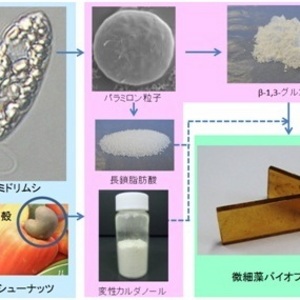Japanese research team produces Euglena-based bioplastic




Advanced Low Carbon Technology Research and Development Program
January 18, 2013
BY Erin Krueger
Advertisement
Advertisement
Related Stories
TRE HOLDINGS, Mitsubishi Gas Chemical to study feasibility of using woody biomass and waste to produce green methanol
TRE Holdings Corp. and Mitsubishi Gas Chemical Company Inc. have signed an MOU for a strategic business collaboration in which they will study the feasibility of using domestic woody biomass and waste to produce green methanol commercially in Japan.
The U.S. Department of Energy Bioenergy Technologies Office (BETO) announced up to $23 million in funding to support research and development (R&D) of domestic chemicals and fuels from biomass and waste resources.
The Department of Energy’s Pacific Northwest National Laboratory is teaming up with Bridgestone to scale up a chemical process that converts ethanol into butadiene—synthetic rubber’s most important ingredient.
The U.S. DOE has announced its intent to issue funding to support high-impact research and development (R&D) projects in two priority areas: sustainable propane and renewable chemicals and algal system cultivation and preprocessing.
Gevo Inc. and LG Chem Ltd. are extending their joint development agreement. The agreement extension enables LG Chem to assess existing assets for deploying Gevo’s Ethanol-to-Olefins (ETO) technology.





